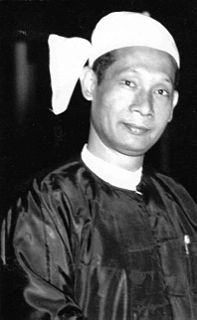
Ba Swe was the second Premier of Burma. He was a leading Burmese politician during the decade after the country gained its independence from Britain in 1948. He held the position of prime minister from 12 June 1956 to 28 February 1957. When Ba Swe became prime minister, Time magazine reported the news in an article titled: 'The Day of the Tiger' based on his nickname 'Big Tiger' since his university days in the 1930s as a student leader.

The Burma Muslim Congress was a Muslim political party in Burma.
Thakin Lwin was a Burmese politician and trade unionist, writer and journalist. He was a leading member of the anti-colonial Dobama Asiayone movement, a parliamentarian, the president of the Trade Union Congress (Burma) and a prominent leader of the Burma Workers and Peasants Party.
The Trade Union Congress (Burma) was a central trade union organization in Burma. The TUC(B) was founded by the Socialist Party in November 1945, in an attempt to counter the influence of the communist-led All Burma Trade Union Congress. Ba Cho was the President of TUC(B). The TUC(B) was an affiliate of the governing Anti-Fascist People's Freedom League.

The National United Front was a political alliance in Burma.

General elections were held in Burma on 6 February 1960 to install a government to take over from General Ne Win's interim administration, established in October 1958. The military-led administration was credited for bringing stability and improving infrastructure in the country, though it suppressed some civil liberties.

General elections were held in Burma to vote for 202 out of 250 seats to the Burmese Chamber of Deputies; the remaining 48 members ) were elected unopposed as no opposition candidates stood against them.

General elections were held in Burma over several months between June 1951 and April 1952 due to internal conflict within the country.

The Kachin National Congress was a political party in Burma.

The Independent Arakanese Parliamentary Group (IAPG) was a political party in Burma.

The Kayah Democratic League was a political party in Burma.

The Kayah National Unity League was a political party in Burma.

The Patriotic Alliance was a political alliance in Burma.

The People's Democratic Front (PDF) was a political alliance in Burma.

The People's Educational and Cultural Development Organisation was a political party in Burma.

The People's Peace Front was a political party in Burma.

The United Hill People's Congress was a political party in Burma.

The Union Party was the ruling political party in Burma in the late 1950s and early 1960s. Formed by a split in the Anti-Fascist People's Freedom League, it was initially known as the Clean AFPFL.

The Stable AFPFL was a political party in Burma.





